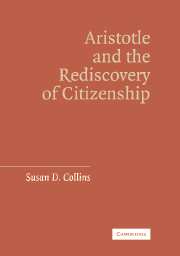Book contents
- Frontmatter
- Contents
- Acknowledgments
- Aristotle and the Rediscovery of Citizenship
- Introduction: The Rediscovery of Citizenship
- 1 Liberal Citizenship and Aristotle's Ethics
- 2 Citizen Virtue and the Longing for the Noble
- 3 Justice as a Virtue
- 4 Prudence, the Good Citizen, and the Good Life
- 5 Citizenship and the Limits of Law
- 6 Political Wit and Enlightenment
- Conclusion: Aristotle and the Rediscovery of Citizenship
- Bibliography
- Index
5 - Citizenship and the Limits of Law
Published online by Cambridge University Press: 17 July 2009
- Frontmatter
- Contents
- Acknowledgments
- Aristotle and the Rediscovery of Citizenship
- Introduction: The Rediscovery of Citizenship
- 1 Liberal Citizenship and Aristotle's Ethics
- 2 Citizen Virtue and the Longing for the Noble
- 3 Justice as a Virtue
- 4 Prudence, the Good Citizen, and the Good Life
- 5 Citizenship and the Limits of Law
- 6 Political Wit and Enlightenment
- Conclusion: Aristotle and the Rediscovery of Citizenship
- Bibliography
- Index
Summary
THE IDENTITY OF THE CITIZEN
Aristotle's consideration of the dispute over rule is preceded and made necessary by the problem with which he introduces Book III and presents first as a practical and legal matter: the problem of the city's identity (Pol. 1274b32–4). He indicates that he will proceed by dividing the city, a composite whole, into its component parts (Pol. 1274b38–41; cf. 1252a17–20). This is formally the procedure he employed at the beginning of the Politics when he divided the political community into the natural associations that form for the sake of some good and then established the city as the natural whole that completes the human quest for the good. In Book III, by contrast, Aristotle begins from a part of the city whose identity is an object of dispute: the citizen. By Book III, the question of the political community has become a part of a larger investigation of the regime, and Aristotle is considering the city not as a natural whole but first and foremost as an arrangement of offices having an authoritative ruling element and directed toward the end established by that element (Pol. 1274b36–8, 1279a25–7, 1289a15–18). In this context, the city acquires its identity, as does the citizen, through the institution of a particular regime, and the identity of the city becomes most obviously a question when it must be constituted – when it is founded or undergoes a revolution.
- Type
- Chapter
- Information
- Aristotle and the Rediscovery of Citizenship , pp. 119 - 146Publisher: Cambridge University PressPrint publication year: 2006



